In Focus This Week
The Key to Election Security is the Power of Community
By Marci Andino, Vice President of the Elections Infrastructure Information Sharing and Analysis Center (EI-ISAC); and
The Honorable Shenna Bellows, Maine Secretary of State and Chairman of the EI-ISAC Executive Committee
Overall voter confidence in the election increased in 2024 as compared to 2020, according to a Pew Research poll. As experts and casual observers alike rush to point to reasons for more positive perceptions among voters, it is important not to overlook the role that effective election administration by the hardworking election officials  across our country has played in this encouraging dynamic. The 2024 election was the nation’s most secure election to date because election offices were more prepared than ever before.
across our country has played in this encouraging dynamic. The 2024 election was the nation’s most secure election to date because election offices were more prepared than ever before.
An Active and Persistent Cyber Threat
In 2024 the enemies of democracy did not simply disappear. The General Election faced varied threats from domestic and foreign threat actors. The election season had barely begun in January when an AI generated deepfake of President Biden’s voice in a robocall in New Hampshire demonstrated the power of new technologies to undermine election integrity. While we didn’t see a significant number of AI deepfakes deployed in a similar manner, election offices still faced a persistent cyber threat in 2024, likely reinforced under the surface by AI. The Center for Internet Security (CIS), which operates the Elections Infrastructure Information Sharing and Analysis Center (EI-ISAC), saw a 158% increase in the number of cyber threats reported by member 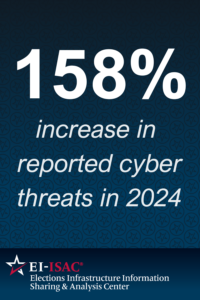 organizations between 2023 and 2024.
organizations between 2023 and 2024.
- In September, a local election office reported receiving an email attempting to impersonate a known election organization. The correspondence was designed to look like an automated email generated from someone filling out a web-based form but was sent from a Gmail address instead of the organization’s official email domain.
- In October, a state election office reported an attempted Distributed Denial of Service (DDoS) attack against their website. In an attempt by cybercriminals to prevent users from accessing the site, the attack reportedly had a rate of approximately 210 requests per second—all of which were successfully blocked.
- On Nov. 5 alone, election offices reported 50 different cyber incidents to the EI-ISAC, involving various means of attempting to breach their administrative systems.
- Between Election Day and the preceding week, Malicious Domain Blocking and Reporting (MDBR), a protective domain name system, or web security, service powered by Akamai blocked more than 138,000 attempts to connect to malicious web domains. Each such blocked event could have resulted in a successful cyber attack as 60,000 of these events were attempts to connect to known malware sites and more than 21,000 were classified as phishing attempts.
- In that same timeframe, the Endpoint Detection and Response (EDR) service powered by CrowdStrike flagged 13 cases of potentially malicious cyber activity on the devices of election offices. Both MDBR and EDR are provided at no cost to election offices through the EI-ISAC.
The EI-ISAC provided not only critical services to election offices but also information sharing resources through a virtual Situation Room open 24/7, so in states like Maine, we could monitor what was happening elsewhere and block suspicious IP addresses and domains from targeting our systems.
A New Arrival on the Scene: Multidimensional Threats
In 2024, a new dynamic threatened the election with the emergence of multidimensional threats on a scale never before seen. Since 2022, CIS has been studying the interconnected nature of cyber, physical, and foreign information operation threats. In June, CIS published a white paper entitled Enhancing Safety in the Connected World: A National Framework for Action, which signaled to organizations across the country the pervasiveness of these multidimensional threats migrating seamlessly between the digital and physical worlds at internet speed. In 2024, election officials had to defend against cyber attacks to their IT systems on one front and physical threats to themselves on another. In a May 2024 Brennan Center survey, 38% of local election officials reported that they experienced threats, harassment, or abuse for fulfilling their election responsibilities. Of those threatened, more than three in five reported having been threatened in person.
Swatting and Doxing Was Prevalent
Election officials across the country faced the threat of doxing, or publishing of their private information, like phone numbers or home addresses, typically with malicious intent.
This multidimensional threat environment reached its crescendo on Election Day as more than 100 facilities in at least nine states received bomb threats — more than 60 in Georgia alone. In Maine on Election Day, multiple schools, including schools where voting was happening, were targets of swatting, with the swatters falsely alleging an active shooter threat. A significant number of these threats nationally had been sent in by email — another indication of the seamless migration of threats between the cyber and physical worlds.
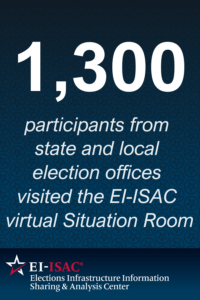 An Undeterred Electorate and Unwavering Election Offices
An Undeterred Electorate and Unwavering Election Offices
Despite such a formidable and complex threat landscape, elections in every jurisdiction across the country proceeded successfully. In Maine, voting continued without interruption. How was that possible? Quite simply, election officials were prepared. The election community responded with the power of community, through increased information sharing, collaboration, and support that overwhelmed the threat.
Preparation Was Key
In the lead up to election season, election officials were busy participating in tabletop exercises, training election workers on cybersecurity awareness, building strong relationships with local law enforcement, and leveraging the benefits of EI-ISAC membership. The EI-ISAC was busy as well. We provided election offices with a number of resources including the EI-ISAC’s Essential Guide to Election Security, a Managing Your Online Presence Guide to share tips on protecting privacy and safeguarding personal information, the EI-ISAC Guide to Preparing for Election Day Disruptions, and numerous Election Security Spotlights full of security best practices applicable to the election community. We also worked to bolster the cyber defense of the election community by increasing the number of election offices taking advantage of the no-cost cybersecurity services available through the EI-ISAC.
Collaboration Was Essential
The CIS Security Operations Center (SOC) worked with elections officials and IT professionals to provide expert resources to resolve problems throughout 2024. And during the height of the election season, election offices could report incidents in real-time and receive up-to-the-minute information about incidents or issues experienced by jurisdictions nationwide. This allowed for seamless information sharing across the entire election community for jurisdictions of all sizes and in all parts of the country. More than 1,300 participants from state and local election offices joined in this virtual means of information sharing, ensuring the election community at large stayed informed throughout the election.
The Results Were Remarkable
All of this preparation paid off as not a single EI-ISAC member organization reported a successful compromise of the election infrastructure. Not a single bomb threat was able to significantly disrupt voting because of the swift response of law enforcement. The 2024 election season taught us all that no matter the threat, no matter how big or small an election office may be, through the power of community, no one fights alone.
Looking Forward to What’s Next
Increased voter confidence in our elections is a testament to the incredible work of state and local election officials in large and small jurisdictions across the country. We owe each of them a debt of gratitude for their selfless service. But in the world of election security, the threats are ever-evolving and outright victory is elusive. Success beyond the 2024 General Election will continue to be found in the power of community, and the EI-ISAC is here for it.
Marci Andino serves as the vice president of the EI-ISAC having joined the Center for Internet Security, which operates the EI-ISAC, in 2021. Prior to joining the EI-ISAC, Andino served as the chief state election official and executive director of the South Carolina State Election Commission for nineteen years.
Shenna Bellows is Maine’s 50th Secretary of State and first female Secretary of State having served in that role since 2021. She chairs the national Executive Committee of the Election Infrastructure-Information Sharing and Analysis Center (EI-ISAC.) She serves on the Executive Board of the National Association of Secretaries of State as the Eastern Region Vice President. She also serves on the Elections Assistance Commission Standards Board. In Maine, Secretary Bellows serves on the state’s Cybersecurity Advisory Council.
electionline Daily News Email
 What’s the best part of waking up? electionline Daily News in your inbox of course so be sure to sign up for your daily dose.
What’s the best part of waking up? electionline Daily News in your inbox of course so be sure to sign up for your daily dose.
Each morning you’ll receive the top headlines of the day, plus a listing of states featured in that day’s news round up.
To sign up, simply visit our site and provide us with your email and you’ll begin receiving the news in your inbox each morning.
We Google so you don’t have to!
Election News This Week
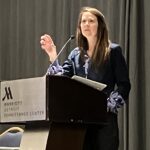 Exit Interview: At an event in Washington, DC this week, Jen Easterly, the outgoing head of the Cybersecurity and Infrastructure Security Agency (CISA), said she hopes her agency is allowed to continue its election-related work under new leadership despite “contentiousness” around that part of its mission. “I really, really hope that we can continue to support those state and local election officials,” she said. “I think they’ve benefited by the resources that we’ve brought. I think they would say that.” With the transition to a new administration, several Republican lawmakers and right-wing advocacy groups have advocated to have CISA shuttered, gutted or have its election responsibilities significantly reduced. According to The Associated Press, Easterly said she was proud of how CISA had built trust and close communications with state and local election officials of both major political parties since the agency began in 2018, under the first Trump administration. She said CISA’s work with the intelligence community to quickly analyze and declassify foreign influence campaigns from Russia, China and Iran ahead of the 2024 presidential election was “incredibly successful.” The agency worked with state and local elections officials after foreign online disinformation surfaced in the weeks leading up to the November election. Those efforts included staged videos from Russian actors falsely portraying election fraud in swing counties. “I think frankly we’re going to see more and more serious threats from our foreign adversaries, and we have to anticipate it and be able to deal with it as we did for the 2024 election,” Easterly said.
Exit Interview: At an event in Washington, DC this week, Jen Easterly, the outgoing head of the Cybersecurity and Infrastructure Security Agency (CISA), said she hopes her agency is allowed to continue its election-related work under new leadership despite “contentiousness” around that part of its mission. “I really, really hope that we can continue to support those state and local election officials,” she said. “I think they’ve benefited by the resources that we’ve brought. I think they would say that.” With the transition to a new administration, several Republican lawmakers and right-wing advocacy groups have advocated to have CISA shuttered, gutted or have its election responsibilities significantly reduced. According to The Associated Press, Easterly said she was proud of how CISA had built trust and close communications with state and local election officials of both major political parties since the agency began in 2018, under the first Trump administration. She said CISA’s work with the intelligence community to quickly analyze and declassify foreign influence campaigns from Russia, China and Iran ahead of the 2024 presidential election was “incredibly successful.” The agency worked with state and local elections officials after foreign online disinformation surfaced in the weeks leading up to the November election. Those efforts included staged videos from Russian actors falsely portraying election fraud in swing counties. “I think frankly we’re going to see more and more serious threats from our foreign adversaries, and we have to anticipate it and be able to deal with it as we did for the 2024 election,” Easterly said.
 Ethics Complaint: A group of Wausau, Wisconsin residents have filed an ethics complaint against Mayor Doug Diny, accusing him of violating both city ethics rules and federal election laws. According to the Wausau Pilot & Review, the complaint centers on Diny’s decision to remove a locked ballot drop box from City Hall steps before the November 2024 election and keep it in his office. The complaint, filed Tuesday with the Wausau City Clerk and Ethics Board, alleges that the mayor acted beyond his authority, interfering with the city clerk’s legal responsibility to oversee the installation and maintenance of ballot drop boxes. In a move that made national headlines and sparked a criminal investigation, Diny moved the drop box to his office on Sunday, Sept. 22 and “took a few photos to memorialize the action.” The complaint alleges Diny did so despite being informed by City Attorney Ann Jacobson that the city clerk, not the mayor, had sole authority over ballot boxes. The mayor also allegedly attempted to pressure the clerk to draft a resolution banning drop boxes, an effort that ultimately failed. “Mayor Diny’s actions prevented voters from using a secure drop box for absentee ballots during a critical time,” the complaint states. It also cites concerns about potential violations of federal laws protecting voting rights and prohibiting voter intimidation or interference.
Ethics Complaint: A group of Wausau, Wisconsin residents have filed an ethics complaint against Mayor Doug Diny, accusing him of violating both city ethics rules and federal election laws. According to the Wausau Pilot & Review, the complaint centers on Diny’s decision to remove a locked ballot drop box from City Hall steps before the November 2024 election and keep it in his office. The complaint, filed Tuesday with the Wausau City Clerk and Ethics Board, alleges that the mayor acted beyond his authority, interfering with the city clerk’s legal responsibility to oversee the installation and maintenance of ballot drop boxes. In a move that made national headlines and sparked a criminal investigation, Diny moved the drop box to his office on Sunday, Sept. 22 and “took a few photos to memorialize the action.” The complaint alleges Diny did so despite being informed by City Attorney Ann Jacobson that the city clerk, not the mayor, had sole authority over ballot boxes. The mayor also allegedly attempted to pressure the clerk to draft a resolution banning drop boxes, an effort that ultimately failed. “Mayor Diny’s actions prevented voters from using a secure drop box for absentee ballots during a critical time,” the complaint states. It also cites concerns about potential violations of federal laws protecting voting rights and prohibiting voter intimidation or interference.
 Public Records: Sheridan County, Wyoming sent an invoice to The Sheridan Press projecting the paper’s public records request regarding the former elections supervisor’s termination would cost $4,000. Former Sheridan County Elections Supervisor James Temple was fired Nov. 12, one week after Election Day. Temple told The Sheridan Press in December he had no disciplinary history as a county employee. The Sheridan Press submitted a public records request Dec. 3, shortly after learning Temple had been fired. The Press requested emails between Temple and Sheridan County Clerk and Recorder Eda Schunk Thompson and requested documents related to Temple’s employment status. Sheridan County Administrative Director Cameron Duff said county officials were “working on (the Press’) records request” Dec. 9. On Dec. 17, Duff forwarded an invoice from Schunk Thompson. The invoice anticipated a total of 83 hours of staff time required to review the approximately 1,680 emails resulting from the Press’ request. Of that total, the invoice indicates the county would charge the Press for 80 hours of clerk’s office staff time. At $50 per hour, 80 hours of staff time would cost $4,000. Duff declined to charge The Press for IT’s time and the county attorney’s office declined to charge for its staff time. In an email to Schunk Thompson and deputy county attorney Clint Beaver Dec. 19, Duff requested the invoice be withdrawn. “I realize that you are spending a lot of time going through this, but for optics, this may be a situation where charging nothing may be the better option,” Duff wrote. Bob Bonnar, a member of the Wyoming Press Association legislative committee and publisher/editor-in-chief of the News Letter Journal, said the Wyoming Legislature implemented fees for public records requests “to address bad actors,” who place a large burden on public records holders. “What (The Press) is doing right here is not one of those instances,” Bonnar said. “This is a clear item of public interest in Sheridan County that you are pursuing.” The Press granted Schunk Thompson an extension to Jan. 21 to fulfill the request; the original 30-day deadline was Jan. 3.
Public Records: Sheridan County, Wyoming sent an invoice to The Sheridan Press projecting the paper’s public records request regarding the former elections supervisor’s termination would cost $4,000. Former Sheridan County Elections Supervisor James Temple was fired Nov. 12, one week after Election Day. Temple told The Sheridan Press in December he had no disciplinary history as a county employee. The Sheridan Press submitted a public records request Dec. 3, shortly after learning Temple had been fired. The Press requested emails between Temple and Sheridan County Clerk and Recorder Eda Schunk Thompson and requested documents related to Temple’s employment status. Sheridan County Administrative Director Cameron Duff said county officials were “working on (the Press’) records request” Dec. 9. On Dec. 17, Duff forwarded an invoice from Schunk Thompson. The invoice anticipated a total of 83 hours of staff time required to review the approximately 1,680 emails resulting from the Press’ request. Of that total, the invoice indicates the county would charge the Press for 80 hours of clerk’s office staff time. At $50 per hour, 80 hours of staff time would cost $4,000. Duff declined to charge The Press for IT’s time and the county attorney’s office declined to charge for its staff time. In an email to Schunk Thompson and deputy county attorney Clint Beaver Dec. 19, Duff requested the invoice be withdrawn. “I realize that you are spending a lot of time going through this, but for optics, this may be a situation where charging nothing may be the better option,” Duff wrote. Bob Bonnar, a member of the Wyoming Press Association legislative committee and publisher/editor-in-chief of the News Letter Journal, said the Wyoming Legislature implemented fees for public records requests “to address bad actors,” who place a large burden on public records holders. “What (The Press) is doing right here is not one of those instances,” Bonnar said. “This is a clear item of public interest in Sheridan County that you are pursuing.” The Press granted Schunk Thompson an extension to Jan. 21 to fulfill the request; the original 30-day deadline was Jan. 3.
 Righting a Wrong: Proving that it’s never too late to get it right, the Hyde Park, Vermont Selectboard met recently to affirm its own legitimacy after discovering a three-decades-old error in how the town has conducted elections on Town Meeting Day. According to the News & Citizen, the error surfaced when the Lanpher Memorial Library board of trustees requested to have its officer elections included on the Australian ballot, or poll vote, that Hyde Park has long used to elect some but not all of their officers at March Town Meeting Day. After consulting the Vermont League of Cities and Towns, town clerk Kim Moulton subsequently discovered that a voter-approved article from the 1994 annual meeting moving some Hyde Park officer elections — including the selectboard members and listers — to Australian ballot did so in violation of state law. Other positions such as town clerk, treasurer and moderator continued to be elected by voice vote, in an apparent 30-year violation of state election law, which requires officer elections to either be conducted entirely by Australian ballot or voice vote. “Local elections are all or nothing by one means, floor or Australian Ballot unless specifically addressed in a Town Charter,” Mark Houle, elections administrator for the Secretary of State’s office, said in a December email to the town. “Therefore, everyone elected by Australian Ballot was not properly elected.” Houle and Hyde Park’s attorney, David Rugh, initially recommended that the selectboard, having only one current member, Matt Morin, who was elected in 2022 by legitimate means, call a special town meeting at which the other members of the selectboard would have to be re-elected in order to comply with the letter of the law. Instead, interim town administrator Stephen McDonald was able to get the Secretary of State’s blessing to allow selectboard members to ratify their own election. A special meeting of the selectboard was held Dec. 9 and the current board ratified the elections held in 2023 and 2024, even though they were technically illegitimately elected.
Righting a Wrong: Proving that it’s never too late to get it right, the Hyde Park, Vermont Selectboard met recently to affirm its own legitimacy after discovering a three-decades-old error in how the town has conducted elections on Town Meeting Day. According to the News & Citizen, the error surfaced when the Lanpher Memorial Library board of trustees requested to have its officer elections included on the Australian ballot, or poll vote, that Hyde Park has long used to elect some but not all of their officers at March Town Meeting Day. After consulting the Vermont League of Cities and Towns, town clerk Kim Moulton subsequently discovered that a voter-approved article from the 1994 annual meeting moving some Hyde Park officer elections — including the selectboard members and listers — to Australian ballot did so in violation of state law. Other positions such as town clerk, treasurer and moderator continued to be elected by voice vote, in an apparent 30-year violation of state election law, which requires officer elections to either be conducted entirely by Australian ballot or voice vote. “Local elections are all or nothing by one means, floor or Australian Ballot unless specifically addressed in a Town Charter,” Mark Houle, elections administrator for the Secretary of State’s office, said in a December email to the town. “Therefore, everyone elected by Australian Ballot was not properly elected.” Houle and Hyde Park’s attorney, David Rugh, initially recommended that the selectboard, having only one current member, Matt Morin, who was elected in 2022 by legitimate means, call a special town meeting at which the other members of the selectboard would have to be re-elected in order to comply with the letter of the law. Instead, interim town administrator Stephen McDonald was able to get the Secretary of State’s blessing to allow selectboard members to ratify their own election. A special meeting of the selectboard was held Dec. 9 and the current board ratified the elections held in 2023 and 2024, even though they were technically illegitimately elected.
Personnel News: Lisa Milone has been sworn in as the New Haven, Connecticut Republican register of voters. West Haven, Connecticut Registrars Beth Kyle (R) and Elizabeth Rousseau (D) have been sworn in. Maine Secretary of State Shenna Bellows has been sworn in for a third term. South Dakota Secretary of State Monae Johnson has announced her re-election bid. Alina Garcia has been sworn in as Miami-Dade County Florida’s new elections supervisor. Patricia Rim has been named the new Jenkins County, Georgia elections supervisor. Falmouth, Massachusetts Town Clerk Michael Palmer is retiring after 22 years on the job. Scott Farrington has been sworn in as the Manatee County, Florida supervisor of elections. Barbara Bosserman is retiring as the Clarke County, Virginia general registrar/election director. Tre Hargett has been elected for a fifth term as Tennessee’s secretary of state.
New Research and Resources
 Training for Election Officials: Election officials learn to carry out their duties by participating in training at the national, state, and local levels. State-level training is a particularly valuable source for best practices and information on the state laws, policies, and procedures that election officials must follow – especially because election administration is largely run, funded, and managed at the state level. Training for Election Officials: A 50-State Analysis from the Bipartisan Policy Center examines state-level training across the country and offers five recommendations and six considerations for states and officials looking to build or improve their training. Election officials have access to state-level training in 43 states: 42 of those states offer training to both chief local election officials and their staff, while 22 offer specific training to new election officials. State-level training is offered in different modalities, on different schedules, and under different legal and logistical frameworks. There is no singular best practice; trainers should make strategic decisions about the location, modality, and design of training offerings to best meet the needs of election officials in their states.
Training for Election Officials: Election officials learn to carry out their duties by participating in training at the national, state, and local levels. State-level training is a particularly valuable source for best practices and information on the state laws, policies, and procedures that election officials must follow – especially because election administration is largely run, funded, and managed at the state level. Training for Election Officials: A 50-State Analysis from the Bipartisan Policy Center examines state-level training across the country and offers five recommendations and six considerations for states and officials looking to build or improve their training. Election officials have access to state-level training in 43 states: 42 of those states offer training to both chief local election officials and their staff, while 22 offer specific training to new election officials. State-level training is offered in different modalities, on different schedules, and under different legal and logistical frameworks. There is no singular best practice; trainers should make strategic decisions about the location, modality, and design of training offerings to best meet the needs of election officials in their states.
Ballot Measures, Legislation & Rulemaking
Matanuska-Susitna Borough, Alaska: The borough assembly will consider a resolution prohibiting election officials from using paper-counting machines to help tally ballots on Election Day. The resolution blocking paper-counting machines would add to a rule passed by the assembly in 2022 that prohibits the use of voting tabulation machines and requires election officials to tally all borough votes by hand. It is co-sponsored by Assembly member Dmitri Fonov, whose district includes sections of Palmer and Wasilla, and Assembly member Ron Bernier, whose district includes Talkeetna. The borough’s paper counting machines are meant to guard against human error by tallying the total number of ballots submitted, Borough Clerk Lonnie McKechnie said in an interview last year. They do not tabulate votes, she said. The machine tally is double-checked by an election official before hand counting begins, she said. The 2022 hand count law did not address paper-counting machines. The newly proposed resolution would update the borough election rules to prohibit paper counters. It would also direct the clerk to propose a pay raise for election officials. Higher pay could help the borough recruit more individuals to process ballots, allowing them to double-check their counts with another person instead of against a machine, Fonov said. The Assembly will also consider a series of technical changes to borough election law. The measures do not require voter approval. The proposals address issues flagged by the borough clerk, attorney, assembly members and citizens during the 2024 election cycle, Assembly member Dmitri Fonov said in an interview.
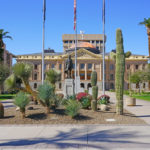 Arizona: Senate Bill 1011, sponsored by Senate President Warren Petersen, R-Gilbert, would require voters who return their early ballots to voting locations after 7 p.m. the Friday before the election to present identification to have their vote counted. This would give voters four fewer days to return their ballot to polling locations without the added step of waiting for ID verification, a change from the existing deadline of 7 p.m. on Election Day to drop off early ballots without an ID. Voters would still have the option to drop off those ballots up until 7 p.m. on Election Day without presenting ID, but only at their county recorder’s office, a huge change from the hundreds of drop-off locations currently available. The proposal would also expand in-person early voting, which currently ends the Friday preceding the election, to the Saturday and Monday prior to the election. It would require early in-person voters to fill out and sign an early voting certificate that reads “I understand that if I commit or attempt to commit fraud in connection with voting, vote a fraudulent ballot or vote more than once in an election, I could be convicted of a felony and fined or imprisoned, or both.”
Arizona: Senate Bill 1011, sponsored by Senate President Warren Petersen, R-Gilbert, would require voters who return their early ballots to voting locations after 7 p.m. the Friday before the election to present identification to have their vote counted. This would give voters four fewer days to return their ballot to polling locations without the added step of waiting for ID verification, a change from the existing deadline of 7 p.m. on Election Day to drop off early ballots without an ID. Voters would still have the option to drop off those ballots up until 7 p.m. on Election Day without presenting ID, but only at their county recorder’s office, a huge change from the hundreds of drop-off locations currently available. The proposal would also expand in-person early voting, which currently ends the Friday preceding the election, to the Saturday and Monday prior to the election. It would require early in-person voters to fill out and sign an early voting certificate that reads “I understand that if I commit or attempt to commit fraud in connection with voting, vote a fraudulent ballot or vote more than once in an election, I could be convicted of a felony and fined or imprisoned, or both.”
A similar proposal in the House of Representatives, sponsored by Republican Reps. Quang Nguyen and Selina Bliss, would start early voting three days prior to the current start date and allow for voters to bring their filled out early ballot to voting locations to be tabulated after 7 p.m. the Friday before the election. But those voters would also be required to provide identification.
Republican Rep. Rachel Keshel, of Tucson, has again this year proposed a bill that would dramatically alter the state’s election systems by banning voting centers and capping precincts at 1,000 registered voters apiece. The proposal would drastically increase the number of precinct locations open across the state, with Arizona counties already concerned about finding enough physical locations, as well as enough poll workers, not to mention the increase in ballots cast that inevitably wouldn’t be counted.
 Indiana: Lawmakers want to make it easier for candidates in primary elections to name election observers, also known as poll watchers. A political party’s state chair or county chairs can appoint watchers to precincts in which the party is on the ballot. They can inspect a precinct election officer’s work, receive a signed summary of the vote, stay at the polls until tabulations are done, accompany an inspector and judge in delivering the tabulation and election returns, report potential violations and more. Party candidates can get their own watchers appointed, but current law requires at least 26% of candidates from the same political party to sign a written statement. That’s “an incredibly high hill to climb,” said Sen. Mike Gaskill, R-Pendleton. His legislation, Senate Bill 199, drops the threshold. Just two or more candidates would have to sign the statement. The Association of the Clerks of Circuit Courts of Indiana and Association of Indiana Counties testified as neutral, but asked lawmakers for better communication between party chairs and clerks about who watchers are, as well as visual identifiers like lanyards. The committee unanimously voted to move the legislation, 9-0. It next goes to the full Senate for consideration.
Indiana: Lawmakers want to make it easier for candidates in primary elections to name election observers, also known as poll watchers. A political party’s state chair or county chairs can appoint watchers to precincts in which the party is on the ballot. They can inspect a precinct election officer’s work, receive a signed summary of the vote, stay at the polls until tabulations are done, accompany an inspector and judge in delivering the tabulation and election returns, report potential violations and more. Party candidates can get their own watchers appointed, but current law requires at least 26% of candidates from the same political party to sign a written statement. That’s “an incredibly high hill to climb,” said Sen. Mike Gaskill, R-Pendleton. His legislation, Senate Bill 199, drops the threshold. Just two or more candidates would have to sign the statement. The Association of the Clerks of Circuit Courts of Indiana and Association of Indiana Counties testified as neutral, but asked lawmakers for better communication between party chairs and clerks about who watchers are, as well as visual identifiers like lanyards. The committee unanimously voted to move the legislation, 9-0. It next goes to the full Senate for consideration.
 Iowa: Ranked choice voting would be prohibited in all Iowa elections — including in local elections — under a proposal by Iowa Secretary of State Paul Pate. A ranked choice voting ban in the state previously was proposed in 2024 as a part of a package of other election laws, but failed to get signed into law. Opponents argue it is too complicated and confusing for voters. Supporters of ranked choice voting argue it saves time by eliminating the need for runoffs, increases voter participation and makes it harder for extremist candidates to win elections. Proponents of ranked choice voting in 2022 pressed the Cedar Rapids City Council to study it if allowed by the state, but the council declined.
Iowa: Ranked choice voting would be prohibited in all Iowa elections — including in local elections — under a proposal by Iowa Secretary of State Paul Pate. A ranked choice voting ban in the state previously was proposed in 2024 as a part of a package of other election laws, but failed to get signed into law. Opponents argue it is too complicated and confusing for voters. Supporters of ranked choice voting argue it saves time by eliminating the need for runoffs, increases voter participation and makes it harder for extremist candidates to win elections. Proponents of ranked choice voting in 2022 pressed the Cedar Rapids City Council to study it if allowed by the state, but the council declined.
Secretary of State Paul Pate has filed a bill that would allow the state registrar to work with state and federal agencies, as well as private entities, to verify voter eligibility. It would also require the Department of Transportation to share a list of noncitizens over the age of seventeen in the state. “We have to be very, very focused on making sure that we’re only letting those who are eligible vote,” Pate said. “We want to make it so that the burden is placed on us when we do voter registration, not with a voter when they show up to vote.” The bill would also allow election officials to question a person’s citizenship status. And it would require a voter registration to be canceled if the voter is not a citizen. A 2024 state audit identified more than 2,100 potential noncitizens who voted in past elections or were registered to vote. KCCI asked Pate if the new piece of legislation was a reaction to that noncitizen voting list. “It is in the sense that I didn’t like the way we had to approach it,” he said. “Putting those people through that was not the best process. I think we can do better, and by getting the law changed, I think that’s the way to do it.”
 Montana: Sen. Theresa Manzella, R-Hamilton, is proposing legislation that would put an eagle or a similar logo on official identification documents issued by the State of Montana, which would be a sign to law enforcement and election officials that the person is a citizen of the United States. She said the measure would help both groups of public officials help determine who is a citizen and who is not at critical points — during law enforcement stops and especially to ensure that only citizens vote, a subject of plenty of debate but rarely documented in Montana elections. The measure was also meant to help ensure safe American borders, as a larger debate about immigration trickles down from the stage of national politics into state policies. Senate Bill 91 would cost an estimated $177,000, mostly due to programming and software costs, so that beginning on Jan. 1, 2026, Montana would start adding an eagle symbol or logo that would indicate a person is a U.S. citizen. Manzella and other proponents of the bill argued that identifications and driver’s licenses can be issued to residents in the country legally but not citizens, adding to the confusion for law enforcement and especially election judges.
Montana: Sen. Theresa Manzella, R-Hamilton, is proposing legislation that would put an eagle or a similar logo on official identification documents issued by the State of Montana, which would be a sign to law enforcement and election officials that the person is a citizen of the United States. She said the measure would help both groups of public officials help determine who is a citizen and who is not at critical points — during law enforcement stops and especially to ensure that only citizens vote, a subject of plenty of debate but rarely documented in Montana elections. The measure was also meant to help ensure safe American borders, as a larger debate about immigration trickles down from the stage of national politics into state policies. Senate Bill 91 would cost an estimated $177,000, mostly due to programming and software costs, so that beginning on Jan. 1, 2026, Montana would start adding an eagle symbol or logo that would indicate a person is a U.S. citizen. Manzella and other proponents of the bill argued that identifications and driver’s licenses can be issued to residents in the country legally but not citizens, adding to the confusion for law enforcement and especially election judges.
 New York: A bill introduced by Assemblywoman Jo Anne Simon (D-Brooklyn) would allow election workers and party and campaign officials to offer “nominal” snacks and refreshments to New Yorkers waiting to vote. “In New York State, despite continued progress on making our elections more accessible, certain polling locations continue to have massive lines,” Simon said in her bill memo. “Leaving those lines for a simple glass of water can forfeit a voter’s position, which is often not an option for individuals taking time off from work. A similar measure had previously passed the state Senate. The measure is sponsored there by state Sen. Zellnor Myrie (D-Brooklyn), who is running for mayor. But it hasn’t passed the Democratic-run Assembly.
New York: A bill introduced by Assemblywoman Jo Anne Simon (D-Brooklyn) would allow election workers and party and campaign officials to offer “nominal” snacks and refreshments to New Yorkers waiting to vote. “In New York State, despite continued progress on making our elections more accessible, certain polling locations continue to have massive lines,” Simon said in her bill memo. “Leaving those lines for a simple glass of water can forfeit a voter’s position, which is often not an option for individuals taking time off from work. A similar measure had previously passed the state Senate. The measure is sponsored there by state Sen. Zellnor Myrie (D-Brooklyn), who is running for mayor. But it hasn’t passed the Democratic-run Assembly.
Democrats in the New York state Senate will advance legislation aimed to protect election workers and prevent voter disenfranchisement, Senate Majority Leader Andrea Stewart-Cousins announced this week. The election reforms being proposed include: Prohibiting deceptive practices and the suppression of voters, and increases penalties for violations of the elective franchise; Banning political spending by foreign-influenced business entities in New York’s state and local elections; Upgrading automatic voter registration and preregistration procedures to include provisions like “back-end” registration; Requiring public-facing websites operated by political committees to contain “paid for by” language and adds such public-facing websites to the list of political communications that qualify as independent expenditures; Authorizing county boards of elections to establish county-wide polling places; Making commissioners full time employees on board of elections; Permitting a voter to register to vote at a secondary residence to which they maintain a continuous connection with an intent to remain; Requiring the state Board of Elections to create a mandatory, uniform training curriculum for all election commissioners; and Permitting the state Board of Elections to join and share information with a multistate voter list maintenance organization such as the Electronic Registration Information Center (ERIC) “This comprehensive package of legislation protects the integrity of our elections while supporting the dedicated workers who make them possible,” Stewart-Cousins said in a statement. “By combating deceptive practices and voter suppression through my bill, S1085, we are ensuring that every New Yorker can cast their ballot free from fear or misinformation. Additionally, by enhancing voter accessibility, strengthening voter registration through secure automatic processes, and increasing transparency in political communications, we are standing firm in defense of every New Yorker’s right to vote. By investing in robust training and fair compensation for election commissioners and workers, we are creating a system that values their critical role. These bills reflect our unwavering commitment to upholding the principles of democracy and ensuring a fair and accessible electoral process for all.”
Gov. Kathy Hochul has signed into law a bill that eliminates conflicts of interest at Boards of Elections. Assemblyman Jonathan Jacobson, D-City of Newburgh, said in a press release that Hochul signed a bill he sponsored that eliminates “conflicts of interest that arise when Board of Elections employees work for a company that sells equipment to the Board, perform campaign services for candidates in their county, or run for office.” Jacobson represents the 105th Assembly District, which includes southern Ulster County. The legislation bars Board of Elections employees from holding financial interest in any company that provides services to candidates in an election overseen by that employee’s board, Jacobson’s office said. This includes campaign consulting, direct mail, digital marketing, and printing services. The new law also restricts Board of Elections employees from having a financial interest in or working for a company that sells equipment to the Board, such as voting machines, electronic poll books, printers, or other equipment, the office said.
 South Dakota: Senator John Carley of Piedmont says the state has to clear up voter registration confusion entirely. Thanking the Secretary of State’s office for removing 273 people off the registry before November’s election. “That’s the problem, they were on in the first place and how do we know all of the noncitizens were removed, we don’t, and so that’s why we need to be proactive and make sure in our code that we say only citizens can vote but, in this bill, it actually adds a penalty.” Carley’s bill adds a Class 5 felony for any individual that violates federal requirements to vote in the state of South Dakota. “The idea of this bill is when you put a deterrent on there…we don’t have a deterrent right now, it says in our South Dakota Constitution you’re supposed to be a citizen to vote but we need it in our code and we need a deterrent,” Carley said.
South Dakota: Senator John Carley of Piedmont says the state has to clear up voter registration confusion entirely. Thanking the Secretary of State’s office for removing 273 people off the registry before November’s election. “That’s the problem, they were on in the first place and how do we know all of the noncitizens were removed, we don’t, and so that’s why we need to be proactive and make sure in our code that we say only citizens can vote but, in this bill, it actually adds a penalty.” Carley’s bill adds a Class 5 felony for any individual that violates federal requirements to vote in the state of South Dakota. “The idea of this bill is when you put a deterrent on there…we don’t have a deterrent right now, it says in our South Dakota Constitution you’re supposed to be a citizen to vote but we need it in our code and we need a deterrent,” Carley said.
 Texas: This session, at least three Democratic state representatives — John Bucy from Austin, Penny Morales Shaw from Houston, and Terry Meza from North Texas — have filed bills that would allow Texans to register to vote online. In the state Senate, Sen. Carol Alvarado, a Democrat from Houston, also filed a bill. The bills require anyone using online registration to have a valid Texas-issued driver’s license or state ID. Similar laws have been enacted in Alabama, Kentucky, and Arizona. Experts say the measure could save Texans millions of dollars and increase election security by improving the accuracy of the state’s voter rolls.
Texas: This session, at least three Democratic state representatives — John Bucy from Austin, Penny Morales Shaw from Houston, and Terry Meza from North Texas — have filed bills that would allow Texans to register to vote online. In the state Senate, Sen. Carol Alvarado, a Democrat from Houston, also filed a bill. The bills require anyone using online registration to have a valid Texas-issued driver’s license or state ID. Similar laws have been enacted in Alabama, Kentucky, and Arizona. Experts say the measure could save Texans millions of dollars and increase election security by improving the accuracy of the state’s voter rolls.
Advocates have been pushing for years for a bill that would expand vote-by-mail access for voters with disabilities. It passed with bipartisan support last session, but Gov. Greg Abbott ® vetoed it At least two similar versions of the bill have been reintroduced this session, by Bucy and Meza.
Under current Texas’ voter ID requirement — modified after a federal court ruling that found the original 2011 law discriminatory — voters must show one of seven types of government-issued photo ID to vote, such as a state driver’s license, a passport, or a concealed-carry handgun license. Voters who don’t have and cannot reasonably obtain one of those seven types can fill out a form at the polls and show an alternative form of ID, such as a utility bill, bank statement, government check, or a voter registration certificate. Bucy filed a bill that would require election workers to accept a photo ID issued by a federally recognized tribe in Texas, an in-state college or university student photo ID, or a photo ID issued by a Texas state agency. State Rep. Erin Zwiener, a Central Texas Democrat, filed a bill that details criteria for an acceptable student ID: The card would have to be unexpired, or no more than four years past expiration, and include the voter’s photograph, date of birth, and full legal name.
A bill introduced by state Sen. Sarah Eckhardt, a Democrat from Austin, would restore voting rights of people with a felony conviction upon their release from incarceration. In addition, a bill by Bucy would require the Texas Secretary of State’s Office to work with the Department of Criminal Justice and the Department of Public Safety to make it easier for Texans with felony convictions to learn when their voting rights are restored and how they can register to vote.
A bill filed by Bucy would allow registered Texas voters who have moved but have yet to update their voter registration to cast a provisional ballot either during early voting or on election day. The provisional ballot would be counted once election officials check the voter’s eligibility and determine that the voter has not already voted in the election.
Harris County, Texas: Harris County Commissioners Court agreed to pay nearly half a million dollars to former elections administrator Cliff Tatum to cover legal fees he faced from a criminal investigation into the 2022 midterm elections. Court members discussed the payment during a short executive session and then returned to approve it without discussion. The reimbursement was approved on a 4-1 vote, with Precinct 3 Commissioner Tom Ramsey the lone dissenter. Tatum will be paid $493,092 by the county. The payment will be made under a policy approved by Commissioners Court in 2022, to reimburse employees who need legal representation for a criminal investigation that “relates to matters within the scope of their employment.” To qualify for reimbursement, the investigation must be concluded and the targeted individual must have faced no charges, received a not guilty verdict or had the case dismissed.
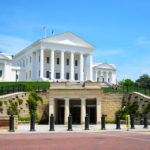 Virginia: Sen. Scott Surovell (D-34) introduced Senate Bill 1009 that would allow localities to adopt ranked choice voting for local elections, a step that’s been taken by Arlington County and considered by Fairfax and Falls Church cities. The proposal includes voter education efforts to explain the ranked choice voting process and outlines adjustments to recount procedures.
Virginia: Sen. Scott Surovell (D-34) introduced Senate Bill 1009 that would allow localities to adopt ranked choice voting for local elections, a step that’s been taken by Arlington County and considered by Fairfax and Falls Church cities. The proposal includes voter education efforts to explain the ranked choice voting process and outlines adjustments to recount procedures.
In the House, Helmer’s House Bill 1794 would consolidate primary election dates during presidential years, aiming to make the process more efficient for election administrators and less confusing for voters.
In a bipartisan 55-44 vote, lawmakers voted to revise Virginia’s process to restore voting rights for people who served time for felony crimes, which Democrats describe as a relic of disenfranchisement. The vote came after Republican Gov. Glenn Youngkin rolled back a process to restore people’s civil rights after they completed sentences for felonies. Virginia is the only state that permanently bans anyone convicted of a felony from voting unless a governor restores their rights. The proposed amendment, HJ2, sponsored by Del. Elizabeth Bennett-Parker (D-Alexandria) would enshrine automatic voting rights restoration into the state’s constitution. Currently, the state Constitution reads, “No person who has been convicted of a felony shall be qualified to vote unless his civil rights have been restored by the Governor or other appropriate authority.” The amendment would update the Constitution to say that no person with a felony conviction would be entitled to vote during incarceration, but would have voting rights restored automatically upon release. Lawmakers have previously attempted to put up the resolutions in 2022 and 2023, though they were unsuccessful in the House, where Republicans previously had an edge. Next year, the amendments’ successful passage will likely again hinge upon Democrats’ ability to preserve their majority in the statehouse. All seats in the House are on the ballot in November.
Wisconsin: Wisconsin’s photo ID requirement for voting would be elevated from a state law to a constitutional amendment under a proposal approved Jan. 14 in the Republican-controlled Assembly with no support from Democrats. The proposed constitutional amendment will appear on the April 1 ballot for voter consideration. It would need to be approved by voters before the constitution would be amended. Even if voters reject it, the voter ID requirement that has been in state law since 2011 will remain in place. Republicans, citing Wisconsin polls that showed broad support for voter ID requirements, hailed the measure as a way to bolster election security and protect the law from being overturned in court. But Democrats said photo ID requirements are often enforced unfairly, making it more difficult for people of color, the disabled and poor people to vote. Democrats argued that lawmakers should focus instead on other issues such as gun control, clean water, affordable housing, and expanding access to child care. If voters agree to place the photo ID requirement in the constitution, it would make it more difficult for a future Legislature controlled by Democrats to change a law they’ve long opposed. Any constitutional amendment must be approved in two consecutive legislative sessions and by a statewide vote of the people. The Republican-controlled Wisconsin Legislature first passed the state’s voter ID law in 2011. It took effect briefly in 2012, but courts that year put it on hold until 2016 after state and federal courts allowed it to take effect. The Legislature last session approved the voter ID constitutional amendment for the first time. The measure was the first proposal considered by the Legislature in 2025. The state Senate passed it on Jan. 8 along a party line vote, with all Republicans in support and Democrats against. The Assembly on Jan. 14 gave it the final approval needed, also on a party line vote, sending it to the ballot for voter consideration.
 Wyoming: A pair of bills advanced out of a House committee that would put more restrictions on registering to vote in Wyoming. The bills call for voters showing proof of Wyoming residency, 30 days of residency in Wyoming and of U.S. citizenship to vote. The Wyoming residency and 30-day duration bill passed on an 8-1 vote with Rep. Mike Yin, D-Jackson, the only member of the House Corporations, Elections and Political Subdivisions Committee voting against it. Bear’s state residency legislation would require voters to prove their Wyoming residency at time of registration. It would be up to the secretary of state to develop rules identifying which forms of identification will be accepted to remove residency, but he clarified Wednesday that a P.O. box address listed on a driver’s license would be accepted. The bill would also require people to have lived in Wyoming for at least 30 days to be able to vote. There now are no durational requirements in Wyoming. So far, 25 states have these requirements. Fremont County Clerk Julie Freese and others said the bill creates confusion about what documents could be used to prove residency and may end up reducing voter turnout. The committee also passed another bill from Bear requiring proof of United States citizenship to register to vote in Wyoming. Accepted forms of ID would include driver’s licenses, U.S. passports, birth certificates and military draft records. The bill would remove ID cards issued by the University of Wyoming, a Wyoming Community College, or a Wyoming public school as acceptable forms of identification. Some conservatives have criticized these IDs, saying they don’t properly identify international students. Others have gone further, saying out-of-state residents receiving education in Wyoming shouldn’t be considered residents. This bill passed unanimously.
Wyoming: A pair of bills advanced out of a House committee that would put more restrictions on registering to vote in Wyoming. The bills call for voters showing proof of Wyoming residency, 30 days of residency in Wyoming and of U.S. citizenship to vote. The Wyoming residency and 30-day duration bill passed on an 8-1 vote with Rep. Mike Yin, D-Jackson, the only member of the House Corporations, Elections and Political Subdivisions Committee voting against it. Bear’s state residency legislation would require voters to prove their Wyoming residency at time of registration. It would be up to the secretary of state to develop rules identifying which forms of identification will be accepted to remove residency, but he clarified Wednesday that a P.O. box address listed on a driver’s license would be accepted. The bill would also require people to have lived in Wyoming for at least 30 days to be able to vote. There now are no durational requirements in Wyoming. So far, 25 states have these requirements. Fremont County Clerk Julie Freese and others said the bill creates confusion about what documents could be used to prove residency and may end up reducing voter turnout. The committee also passed another bill from Bear requiring proof of United States citizenship to register to vote in Wyoming. Accepted forms of ID would include driver’s licenses, U.S. passports, birth certificates and military draft records. The bill would remove ID cards issued by the University of Wyoming, a Wyoming Community College, or a Wyoming public school as acceptable forms of identification. Some conservatives have criticized these IDs, saying they don’t properly identify international students. Others have gone further, saying out-of-state residents receiving education in Wyoming shouldn’t be considered residents. This bill passed unanimously.
Legal Updates
 Federal Litigation: A New York appeals court ruled that Fox Corporation must face Smartmatic’s defamation lawsuit over the airing of 2020 election lies on Fox News. Smartmatic, the voting technology company that Fox News guests and hosts falsely accused of rigging the 2020 election, sued both Fox News and its parent company, Fox Corp in 2021. As part of its lawsuit, Smartmatic alleged that Rupert Murdoch and his eldest son, Fox Corp. CEO Lachlan Murdoch, directed the cable network to embrace a “disinformation campaign to win back its audience” after Joe Biden won the election. The latest ruling represents a key victory for Smartmatic’s efforts to go after the right-wing media outlet over its promotion of debunked claims that the election was stolen from former President Donald Trump. The Fox entities have denied wrongdoing. In its ruling, the unanimous New York appeals court cited, in part, similar legal findings from the Delaware judge who oversaw a related case brought by Dominion Voting Systems over Fox’s airing of 2020 election lies. Fox paid more than $787 million to settle that lawsuit in 2023, in the largest publicly known defamation settlement in US history. “Here, consistent with the Dominion decisions, we find that the allegations in the first amended complaint relating to Fox Corporation directing the other defendants to undertake a disinformation campaign… sufficiently allege Fox Corporation’s ‘direct liability’ for the challenged defamatory statements,” the New York appellate ruling said. The lawsuit is still in the discovery phase but could head to trial later this year, unless there is an out-of-court settlement, as is common in media defamation cases.
Federal Litigation: A New York appeals court ruled that Fox Corporation must face Smartmatic’s defamation lawsuit over the airing of 2020 election lies on Fox News. Smartmatic, the voting technology company that Fox News guests and hosts falsely accused of rigging the 2020 election, sued both Fox News and its parent company, Fox Corp in 2021. As part of its lawsuit, Smartmatic alleged that Rupert Murdoch and his eldest son, Fox Corp. CEO Lachlan Murdoch, directed the cable network to embrace a “disinformation campaign to win back its audience” after Joe Biden won the election. The latest ruling represents a key victory for Smartmatic’s efforts to go after the right-wing media outlet over its promotion of debunked claims that the election was stolen from former President Donald Trump. The Fox entities have denied wrongdoing. In its ruling, the unanimous New York appeals court cited, in part, similar legal findings from the Delaware judge who oversaw a related case brought by Dominion Voting Systems over Fox’s airing of 2020 election lies. Fox paid more than $787 million to settle that lawsuit in 2023, in the largest publicly known defamation settlement in US history. “Here, consistent with the Dominion decisions, we find that the allegations in the first amended complaint relating to Fox Corporation directing the other defendants to undertake a disinformation campaign… sufficiently allege Fox Corporation’s ‘direct liability’ for the challenged defamatory statements,” the New York appellate ruling said. The lawsuit is still in the discovery phase but could head to trial later this year, unless there is an out-of-court settlement, as is common in media defamation cases.
 California: State Atty. Gen. Rob Bonta and Secretary of State Shirley Weber filed a notice to appeal this week, the latest step in a battle with Huntington Beach over voter identification. Bonta and Weber are seeking to reverse an Orange County Superior Court decision from November, where a judge ruled that the matter was not yet “ripe for adjudication.” Measure A, passed by Huntington Beach voters last March, allows the city to require voter identification be shown when voting in person during municipal elections, starting in 2026. But the language of the measure states that the city “may” require voter ID, not that it definitively will. Judge Nico Dourbetas wrote that Measure A is “permissive and discretionary in character, and thus currently presents no conflict with state elections law.” Bonta and Weber disagree. “The Orange County Superior Court got it wrong — plain and simple,” Bonta said in a statement Tuesday. “Secretary of State Weber and I firmly believe not only that the time is right for us to bring our lawsuit, but also that Huntington Beach’s voter ID policy is unlawful.” Bonta said that a brief will be filed with the California Fourth District Court of Appeal in coming weeks, stating reasons they believe the trial court’s judgment was wrong.
California: State Atty. Gen. Rob Bonta and Secretary of State Shirley Weber filed a notice to appeal this week, the latest step in a battle with Huntington Beach over voter identification. Bonta and Weber are seeking to reverse an Orange County Superior Court decision from November, where a judge ruled that the matter was not yet “ripe for adjudication.” Measure A, passed by Huntington Beach voters last March, allows the city to require voter identification be shown when voting in person during municipal elections, starting in 2026. But the language of the measure states that the city “may” require voter ID, not that it definitively will. Judge Nico Dourbetas wrote that Measure A is “permissive and discretionary in character, and thus currently presents no conflict with state elections law.” Bonta and Weber disagree. “The Orange County Superior Court got it wrong — plain and simple,” Bonta said in a statement Tuesday. “Secretary of State Weber and I firmly believe not only that the time is right for us to bring our lawsuit, but also that Huntington Beach’s voter ID policy is unlawful.” Bonta said that a brief will be filed with the California Fourth District Court of Appeal in coming weeks, stating reasons they believe the trial court’s judgment was wrong.
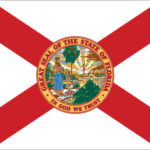 Florida: The Florida Supreme Court said it will take up an appeal by a convicted felon who was one of 20 people accused by Gov. Ron DeSantis and other state officials in 2022 of registering and voting when they were ineligible. Justices issued an order agreeing to hear the appeal by Terry Hubbard, who went to the Supreme Court in October after the 4th District Court of Appeal ruled that charges against him should move forward. The order did not explain the justices’ reasons. But the order came after Attorney General Ashley Moody’s office contended in a brief last month that the Supreme Court should decline to take up the case. The order did not set a date for arguments. The Supreme Court case centers on a question about whether the statewide prosecutor’s office had authority to file charges against Hubbard. A Broward County circuit judge dismissed the case because he said Hubbard’s alleged wrongdoing occurred in one judicial circuit and that the statewide prosecutor only had jurisdiction in cases involving multiple circuits. But a panel of the 4th District Court of Appeal in July overturned that ruling, and the full appeals court later declined a request for a rehearing. In the brief filed last month at the Supreme Court, Moody’s office argued, in part, that the statewide prosecutor had jurisdiction because the alleged voting crimes involved two judicial circuits. That is because Hubbard filled out voter registration applications in Broward County and the information was transmitted to the Florida Department of State in Leon County. Broward County is in the 17th Judicial Circuit, while Leon County is in the 2nd Judicial Circuit.
Florida: The Florida Supreme Court said it will take up an appeal by a convicted felon who was one of 20 people accused by Gov. Ron DeSantis and other state officials in 2022 of registering and voting when they were ineligible. Justices issued an order agreeing to hear the appeal by Terry Hubbard, who went to the Supreme Court in October after the 4th District Court of Appeal ruled that charges against him should move forward. The order did not explain the justices’ reasons. But the order came after Attorney General Ashley Moody’s office contended in a brief last month that the Supreme Court should decline to take up the case. The order did not set a date for arguments. The Supreme Court case centers on a question about whether the statewide prosecutor’s office had authority to file charges against Hubbard. A Broward County circuit judge dismissed the case because he said Hubbard’s alleged wrongdoing occurred in one judicial circuit and that the statewide prosecutor only had jurisdiction in cases involving multiple circuits. But a panel of the 4th District Court of Appeal in July overturned that ruling, and the full appeals court later declined a request for a rehearing. In the brief filed last month at the Supreme Court, Moody’s office argued, in part, that the statewide prosecutor had jurisdiction because the alleged voting crimes involved two judicial circuits. That is because Hubbard filled out voter registration applications in Broward County and the information was transmitted to the Florida Department of State in Leon County. Broward County is in the 17th Judicial Circuit, while Leon County is in the 2nd Judicial Circuit.
The American Civil Liberties Union filed a lawsuit accusing Florida Gov. Ron DeSantis of failing to fulfill his constitutional obligation to call special elections for two seats in the state House and Senate. The seats in question were vacated in November by state Rep. Joel Rudman and state Sen. Randy Fine, who resigned to run for two congressional seats that opened up when President-elect Donald Trump named U.S. Reps. Matt Gaetz and Mike Waltz as Cabinet picks. Shortly after Gaetz and Waltz resigned, DeSantis called for special congressional elections with a Jan. 28 primary and an April 1 general. He has yet to set elections for the state-level openings, however. “I don’t understand why the governor resists calling special elections in a timely manner. From Jeb Bush to Rick Scott, past governors moved quickly to ensure the people retained their voice in government. DeSantis’s refusal to do so is both troubling and illegal,” said Nicholas Warren, a staff attorney for the ACLU of Florida. Asked about the lawsuit, the governor’s office referred comment to the Florida Department of State, which did not immediately respond.
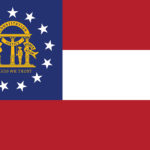 Georgia: U.S. District Judge Beryl Howell held Rudy Giuliani in contempt for continuing to peddle baseless claims against two former Georgia poll workers, which already led to a $148 million defamation judgment against him. Ruby Freeman and Wandrea “Shaye” Moss asked Howell to hold Giuliani in contempt for violating a permanent injunction, to which he consented, by repeating the false claims on episodes of his nightly livestreams in November after Donald Trump’s election. Howell found that Giuliani had clearly violated the terms of the permanent injunction over the course of four episodes of his “America’s Mayor Live,” where he repeated statements specified in the injunction. “It is outrageous and shameful that Giuliani dares to suggest he is the one being treated unfairly when his comments caused plaintiffs real harm,” Howell said as she issued her ruling from the bench. She ordered Giuliani to file a declaration within 10 days stating that he acknowledges that, based on testimony at trial from Freeman, Moss and several Georgia election officials who investigated his claims, that his accusations of impropriety were baseless. If he fails to do so by that deadline, she would impose a $200 fine each day.
Georgia: U.S. District Judge Beryl Howell held Rudy Giuliani in contempt for continuing to peddle baseless claims against two former Georgia poll workers, which already led to a $148 million defamation judgment against him. Ruby Freeman and Wandrea “Shaye” Moss asked Howell to hold Giuliani in contempt for violating a permanent injunction, to which he consented, by repeating the false claims on episodes of his nightly livestreams in November after Donald Trump’s election. Howell found that Giuliani had clearly violated the terms of the permanent injunction over the course of four episodes of his “America’s Mayor Live,” where he repeated statements specified in the injunction. “It is outrageous and shameful that Giuliani dares to suggest he is the one being treated unfairly when his comments caused plaintiffs real harm,” Howell said as she issued her ruling from the bench. She ordered Giuliani to file a declaration within 10 days stating that he acknowledges that, based on testimony at trial from Freeman, Moss and several Georgia election officials who investigated his claims, that his accusations of impropriety were baseless. If he fails to do so by that deadline, she would impose a $200 fine each day.
 Hawaii: Rejecting a lawsuit against Hawaiʻi election officials, the state’s highest court said state Rep. Elijah Pierick prevailed in the 2024 race for District 39. Pierick, a Republican representing Royal Kunia, Village Park, Honouliuli, Ho‘opili and a portion of Waipahu, edged Democratic challenger Corey Rosenlee 4,712 votes to 4,701. In his challenge to the results, Rosenlee alleged mistakes by Honolulu City Clerk Glenn Takahashi in reviewing signatures on return identification envelopes and in securing and monitoring in-person voting lines, among other things. Rejecting a voter’s signature as deficient amounted to an equal protection and due process violation, Rosenlee argued. The court determined in its ruling that Rosenlee did not prove his case, and that Pierick won a majority of the votes and so should be certified the winner by state Chief Election Officer Scott Nago.
Hawaii: Rejecting a lawsuit against Hawaiʻi election officials, the state’s highest court said state Rep. Elijah Pierick prevailed in the 2024 race for District 39. Pierick, a Republican representing Royal Kunia, Village Park, Honouliuli, Ho‘opili and a portion of Waipahu, edged Democratic challenger Corey Rosenlee 4,712 votes to 4,701. In his challenge to the results, Rosenlee alleged mistakes by Honolulu City Clerk Glenn Takahashi in reviewing signatures on return identification envelopes and in securing and monitoring in-person voting lines, among other things. Rejecting a voter’s signature as deficient amounted to an equal protection and due process violation, Rosenlee argued. The court determined in its ruling that Rosenlee did not prove his case, and that Pierick won a majority of the votes and so should be certified the winner by state Chief Election Officer Scott Nago.
 Iowa: LULAC Iowa has dismissed its lawsuit trying to block a voting reform law that went into effect in 2021. LULAC Iowa originally filed the lawsuit in March 2021 less than 24 hours after Iowa Governor Kim Reynolds signed it. The voting reform law in question, Senate File 413, reduced Iowa’s early voting period from 29 to 20 days, closed polls an hour earlier on Election Day, and put tighter restraints on absentee voting. When the bill passed, Republicans said it was necessary to make Iowans feel confident that elections are secure. Opponents, including Democratic lawmakers and the ACLU of Iowa, called it a voter suppression law. At the time of the lawsuit’s filing, LULAC Iowa state director Nick Salazar criticized the law, saying it “creates undue burden to our constitutional right to vote and restricts our access to the ballot box.” Salazar specifically expressed concern over the risk of criminal charges against people who help those outside their immediate family with their absentee ballot. LULAC’s lawsuit named Secretary of State Paul Pate and former Iowa Attorney General Tom Miller as defendants, because the Secretary of State and Attorney General are responsible for administering elections and enforcing state laws. Pate released a statement regarding the withdrawal. “As a top-ranked state for election administration, we prioritize delivering safe, secure, and fair elections for all Iowans,” Secretary Pate said. “We are pleased to move on from this baseless lawsuit and remain committed to securing Iowa’s elections through a layered approach that balances voter participation and election integrity.”
Iowa: LULAC Iowa has dismissed its lawsuit trying to block a voting reform law that went into effect in 2021. LULAC Iowa originally filed the lawsuit in March 2021 less than 24 hours after Iowa Governor Kim Reynolds signed it. The voting reform law in question, Senate File 413, reduced Iowa’s early voting period from 29 to 20 days, closed polls an hour earlier on Election Day, and put tighter restraints on absentee voting. When the bill passed, Republicans said it was necessary to make Iowans feel confident that elections are secure. Opponents, including Democratic lawmakers and the ACLU of Iowa, called it a voter suppression law. At the time of the lawsuit’s filing, LULAC Iowa state director Nick Salazar criticized the law, saying it “creates undue burden to our constitutional right to vote and restricts our access to the ballot box.” Salazar specifically expressed concern over the risk of criminal charges against people who help those outside their immediate family with their absentee ballot. LULAC’s lawsuit named Secretary of State Paul Pate and former Iowa Attorney General Tom Miller as defendants, because the Secretary of State and Attorney General are responsible for administering elections and enforcing state laws. Pate released a statement regarding the withdrawal. “As a top-ranked state for election administration, we prioritize delivering safe, secure, and fair elections for all Iowans,” Secretary Pate said. “We are pleased to move on from this baseless lawsuit and remain committed to securing Iowa’s elections through a layered approach that balances voter participation and election integrity.”
 Minnesota: Judge Tracy Perzel has ruled that DFL Rep. Brad Tabke’s narrow victory in a Twin Cities suburb House district is valid and there should be no special election for the seat. Tabke defeated GOP challenger Aaron Paul by 14 votes in November and there was a recount that upheld his win. However, during the election, 20 missing ballots from one precinct were mistakenly tossed in the trash, election officials said, prompting Republicans to file an election contest seeking a new election for the seat. Voters linked to the ballots at issue testified during a two-day trial; six of them said under oath that they voted for Tabke while six others said they voted for Paul. Tabke’s attorney said voters’ sworn statements provided evidence that the outcome of the election remains unchanged, but Republicans argued the error was a “deliberate, serious, and material violation of Minnesota election law” that would require a new election. Perzel determined that Tabke “remains the candidate with the most votes legally cast in the 2024 General Election” and that “the election is not invalid.”
Minnesota: Judge Tracy Perzel has ruled that DFL Rep. Brad Tabke’s narrow victory in a Twin Cities suburb House district is valid and there should be no special election for the seat. Tabke defeated GOP challenger Aaron Paul by 14 votes in November and there was a recount that upheld his win. However, during the election, 20 missing ballots from one precinct were mistakenly tossed in the trash, election officials said, prompting Republicans to file an election contest seeking a new election for the seat. Voters linked to the ballots at issue testified during a two-day trial; six of them said under oath that they voted for Tabke while six others said they voted for Paul. Tabke’s attorney said voters’ sworn statements provided evidence that the outcome of the election remains unchanged, but Republicans argued the error was a “deliberate, serious, and material violation of Minnesota election law” that would require a new election. Perzel determined that Tabke “remains the candidate with the most votes legally cast in the 2024 General Election” and that “the election is not invalid.”
 Nevada: Mark White of Las Vegas was found guilty of “Attempted Voting More Than Once at Same Election,” a category E felony, for casting votes in both Las Vegas and Kingman, Ariz. White was sentenced to probation that is not to exceed 18 months and a 12-36 month suspended sentence. He pled guilty back in September 2024. “As I have repeatedly and consistently said, we will prosecute any credible allegations of voter fraud that are uncovered,” said Nevada Attorney General Aaron Ford. “Voter fraud undercuts trust in our institutions and is a direct attack on our system of democracy.” “Nevada runs some of the most secure elections in the country, and that means investigating any potential instances of fraud,” said Nevada Secretary of State Cisco Aguilar.
Nevada: Mark White of Las Vegas was found guilty of “Attempted Voting More Than Once at Same Election,” a category E felony, for casting votes in both Las Vegas and Kingman, Ariz. White was sentenced to probation that is not to exceed 18 months and a 12-36 month suspended sentence. He pled guilty back in September 2024. “As I have repeatedly and consistently said, we will prosecute any credible allegations of voter fraud that are uncovered,” said Nevada Attorney General Aaron Ford. “Voter fraud undercuts trust in our institutions and is a direct attack on our system of democracy.” “Nevada runs some of the most secure elections in the country, and that means investigating any potential instances of fraud,” said Nevada Secretary of State Cisco Aguilar.
 New York: A former New York City Board of Elections lawyer — whose complaint alleging Executive Director Michael Ryan subjected her to repeated comments about her ethnicity and gender spurred a city probe — asked a judge to let her file suit. Stephanie Jaquez formally petitioned in Manhattan state Supreme Court for permission to proceed with a case after waiting for the city Department of Investigation to complete its probe of her complaint. Jaquez alleged in a sworn statement on Thursday that a “general lack of seriousness or interest that the BOE leadership was taking regarding my substantiated claims” and described a situation with no way out except to resign. She said that she did not believe Ryan necessarily intended to be cruel, “but rather that he was an unserious person who lacked self-awareness about the tremendously negative impact his inappropriate behavior had on me.” In the filing Jaquez asked a judge to waive the 90-day window after an incident when someone hoping to sue the city must notify the comptroller’s office, because she’d made formal complaints with both the Board of Elections and the Department of Investigation, with DOI asking her not to describe the allegations publicly while they investigated. Spokespersons for DOI and the Board of Elections didn’t immediately respond to requests for comment.
New York: A former New York City Board of Elections lawyer — whose complaint alleging Executive Director Michael Ryan subjected her to repeated comments about her ethnicity and gender spurred a city probe — asked a judge to let her file suit. Stephanie Jaquez formally petitioned in Manhattan state Supreme Court for permission to proceed with a case after waiting for the city Department of Investigation to complete its probe of her complaint. Jaquez alleged in a sworn statement on Thursday that a “general lack of seriousness or interest that the BOE leadership was taking regarding my substantiated claims” and described a situation with no way out except to resign. She said that she did not believe Ryan necessarily intended to be cruel, “but rather that he was an unserious person who lacked self-awareness about the tremendously negative impact his inappropriate behavior had on me.” In the filing Jaquez asked a judge to waive the 90-day window after an incident when someone hoping to sue the city must notify the comptroller’s office, because she’d made formal complaints with both the Board of Elections and the Department of Investigation, with DOI asking her not to describe the allegations publicly while they investigated. Spokespersons for DOI and the Board of Elections didn’t immediately respond to requests for comment.
 North Carolina: The federal Fourth Circuit Court of Appeals said it will hear Republican State appeals court Judge Jefferson Griffin’s elections case, where he’s seeking to invalidate more than 60,000 votes in the race for a seat on the North Carolina Supreme Court. The federal court agreed to incumbent Democratic Supreme Court Justice Allison Riggs’ request to put the case on a fast track, scheduling oral arguments for Jan. 27. The state Supreme Court is also considering Griffin’s case. Republican cases to invalidate North Carolina votes occupied two courts on Jan. 12. A state Superior Court judge denied a Republican request that could have resulted in thousands of votes cast in last fall’s statewide races being thrown out. Except for the contest between Riggs and Griffin, all statewide races have been certified and the winning candidates sworn into office.
North Carolina: The federal Fourth Circuit Court of Appeals said it will hear Republican State appeals court Judge Jefferson Griffin’s elections case, where he’s seeking to invalidate more than 60,000 votes in the race for a seat on the North Carolina Supreme Court. The federal court agreed to incumbent Democratic Supreme Court Justice Allison Riggs’ request to put the case on a fast track, scheduling oral arguments for Jan. 27. The state Supreme Court is also considering Griffin’s case. Republican cases to invalidate North Carolina votes occupied two courts on Jan. 12. A state Superior Court judge denied a Republican request that could have resulted in thousands of votes cast in last fall’s statewide races being thrown out. Except for the contest between Riggs and Griffin, all statewide races have been certified and the winning candidates sworn into office.
 North Dakota: The U.S. Supreme Court declined to take up a Republican lawsuit alleging that the state engaged in unconstitutional racial gerrymandering when it created two majority-Native American legislative districts following the 2020 census. The Court’s move effectively leaves in place a unanimous November 2023 ruling rejecting two local GOP officials’ bid to strike down North Dakota House Subdistricts 4A and 9A, which respectively encompassed the Fort Berthold and Turtle Mountain Indian Reservations. The order from the high court specifically affirmed the panel’s rejection of the Republicans’ claims against Subdistrict 4A, and dismissed their challenge to Subdistrict 9A altogether. As the U.S. Department of Justice and tribal nations that were involved in the case pointed out, none of the GOP plaintiffs ever resided in Subdistrict 9A, meaning they lacked standing to contest its boundaries. In the 2023 ruling at issue, a federal three-judge panel agreed with state officials who argued at the time that the North Dakota Legislative Assembly drew the Native American subdistricts in order to comply with the Voting Rights Act (VRA) — a federal statute that protects minority voters from discrimination. According to the GOP plaintiffs however, the districts were impermissibly drawn using race as the predominant factor in violation of the 14th Amendment’s Equal Protection Clause.
North Dakota: The U.S. Supreme Court declined to take up a Republican lawsuit alleging that the state engaged in unconstitutional racial gerrymandering when it created two majority-Native American legislative districts following the 2020 census. The Court’s move effectively leaves in place a unanimous November 2023 ruling rejecting two local GOP officials’ bid to strike down North Dakota House Subdistricts 4A and 9A, which respectively encompassed the Fort Berthold and Turtle Mountain Indian Reservations. The order from the high court specifically affirmed the panel’s rejection of the Republicans’ claims against Subdistrict 4A, and dismissed their challenge to Subdistrict 9A altogether. As the U.S. Department of Justice and tribal nations that were involved in the case pointed out, none of the GOP plaintiffs ever resided in Subdistrict 9A, meaning they lacked standing to contest its boundaries. In the 2023 ruling at issue, a federal three-judge panel agreed with state officials who argued at the time that the North Dakota Legislative Assembly drew the Native American subdistricts in order to comply with the Voting Rights Act (VRA) — a federal statute that protects minority voters from discrimination. According to the GOP plaintiffs however, the districts were impermissibly drawn using race as the predominant factor in violation of the 14th Amendment’s Equal Protection Clause.
 South Dakota: An effort to force Lawrence County to count election ballots by hand and rid the county of electronic machines was turned away Friday by a circuit court judge. Nichole Braithwait had filed suit against the Lawrence County Commission and its commissioners after they failed to certify a petition drive that would have put the issue to a public vote. Braithwait wanted to eliminate the county’s use of electronic voting machines and electronic vote tabulators, which would require election results to be based off of hand-counted tallies. Braithwait submitted a petition to the Lawrence County auditor with about 1,300 signatures to put the issue to voters. But the Lawrence County Commission refused to certify the issue for the ballot, reckoning that it was prohibited by law from certifying an issue that it couldn’t legally decide on its own.
South Dakota: An effort to force Lawrence County to count election ballots by hand and rid the county of electronic machines was turned away Friday by a circuit court judge. Nichole Braithwait had filed suit against the Lawrence County Commission and its commissioners after they failed to certify a petition drive that would have put the issue to a public vote. Braithwait wanted to eliminate the county’s use of electronic voting machines and electronic vote tabulators, which would require election results to be based off of hand-counted tallies. Braithwait submitted a petition to the Lawrence County auditor with about 1,300 signatures to put the issue to voters. But the Lawrence County Commission refused to certify the issue for the ballot, reckoning that it was prohibited by law from certifying an issue that it couldn’t legally decide on its own.
 Tennessee: A panel of the 6th U.S. Circuit Court of Appeals heard arguments this week in a case to determine the future of Tennessee voter registration policies that – by some estimates – have disenfranchised half a million state residents with past felony convictions. A class action lawsuit, filed in 2020 by the Tennessee State Conference of the NAACP and five voters, accuses state officials of establishing byzantine, inequitable and onerous procedures that effectively prevent qualified voters with past convictions from casting a ballot in violation of the National Voter Registration Act (NVRA). A federal judge in Nashville temporarily blocked the state rules in April, but the state successfully appealed to keep them in place ahead of the November 2024 elections while litigation continued. This week, an attorney representing the Tennessee Attorney General defended state voting right restoration rules before the three-judge appellate panel as a lawful exercise of state power and argued the NAACP lacked the legal right to challenge the rules on behalf of voters. “The NVRA ensures eligible applicants can register to vote but it also exists to protect the integrity of the election process,” said Philip Hammersley, assistant solicitor general. “Tennessee’s (restoration) policy furthers both aims by providing election officials what they need to distinguish between felons who are eligible to vote and those who are not.” Hammersley focused much of the state’s arguments in disputing the NAACP had legal standing to file suit at all.
Tennessee: A panel of the 6th U.S. Circuit Court of Appeals heard arguments this week in a case to determine the future of Tennessee voter registration policies that – by some estimates – have disenfranchised half a million state residents with past felony convictions. A class action lawsuit, filed in 2020 by the Tennessee State Conference of the NAACP and five voters, accuses state officials of establishing byzantine, inequitable and onerous procedures that effectively prevent qualified voters with past convictions from casting a ballot in violation of the National Voter Registration Act (NVRA). A federal judge in Nashville temporarily blocked the state rules in April, but the state successfully appealed to keep them in place ahead of the November 2024 elections while litigation continued. This week, an attorney representing the Tennessee Attorney General defended state voting right restoration rules before the three-judge appellate panel as a lawful exercise of state power and argued the NAACP lacked the legal right to challenge the rules on behalf of voters. “The NVRA ensures eligible applicants can register to vote but it also exists to protect the integrity of the election process,” said Philip Hammersley, assistant solicitor general. “Tennessee’s (restoration) policy furthers both aims by providing election officials what they need to distinguish between felons who are eligible to vote and those who are not.” Hammersley focused much of the state’s arguments in disputing the NAACP had legal standing to file suit at all.
Opinions This Week
National Opinions: What to watch in 2025 | U.S. Department of Justice | Artificial Intelligence | SAVE Act | State voting rights
Arizona: Early voting
Illinois: Democracy
Maine: Voter ID ballot measure; Voter suppression
North Carolina: Ranked choice voting, II | Challenged voters | Supreme Court race, II
North Dakota: Special election costs
Pennsylvania: Poll workers | Early voting
Wisconsin: Election legislation
Upcoming Events
Fair Elections and Voting Rights: What’s Ahead in the Next Four Years?: The Safeguarding Democracy Project at UCLA promotes research, collaboration, and advocacy under the leadership of UCLA Law Professor Richard L. Hasen; one of the nation’s leading election scholars. The Safeguarding Democracy Project is built upon the premise that tackling issues of the U.S. election integrity must be collaborative: across ideologies, across scholarly disciplines, and as a bridge between theory and practice. This webinar will feature Amy Gardner, The Washington Post, Pamela Karlan, Stanford Law School, and Stephen Richer, Recorder of Maricopa County, Arizona (until Jan.1, 2025). Moderated by Richard L. Hasen (Director, Safeguarding Democracy Project). When: Jan. 28, 2025, 3:15pm Eastern. Where: Online
National Association of Secretaries of State Winter Conference: Join NASS at its Winter Conference in Washington, DC. The event will include workshops, committee meetings and awards luncheon. When: January 29-February 1, 2025. Where: Washington, DC.
National Association of State Election Directors: Join NASED for their 2025 Winter Conference in Washington, DC. For security purposes, information about the agenda is limited, but a notional agenda is available here to help with scheduling. Tuesday, February 4 is closed to NASED Members only. Information about the conference venue and conference room block will be provided with your registration confirmation. Be advised that the NASED conference is not taking place concurrently with the National Association of Secretaries of State (NASS) conference. When: February 2-5, 2025. Where: Washington, DC.
Finding Common Ground on Modernizing Voter Registration: The Safeguarding Democracy Project at UCLA promotes research, collaboration, and advocacy under the leadership of UCLA Law Professor Richard L. Hasen; one of the nation’s leading election scholars. The Safeguarding Democracy Project is built upon the premise that tackling issues of the U.S. election integrity must be collaborative: across ideologies, across scholarly disciplines, and as a bridge between theory and practice. Join us for a series of events as we address these hard hitting issues. This discussion will feature: Christina Adkins, Director of Elections, Texas Secretary of State’s Office, Judd Choate, Director of Elections in Colorado, and Charles H. Stewart III, MIT and be moderated by Richard L. Hasen, (Director, Safeguarding Democracy Project, UCLA). When: Feb. 13, 3:15pm Eastern. Where: Online.
What Do Documentary Proof of Citizenship Requirements for Voter Registration Accomplish?: The Safeguarding Democracy Project at UCLA promotes research, collaboration, and advocacy under the leadership of UCLA Law Professor Richard L. Hasen; one of the nation’s leading election scholars. The Safeguarding Democracy Project is built upon the premise that tackling issues of the U.S. election integrity must be collaborative: across ideologies, across scholarly disciplines, and as a bridge between theory and practice. This session will feature: Adrian Fontes, Arizona Secretary of State, Walter Olson, Senior Fellow at the Cato Institute, and Nina Perales, Vice President of Litigation, MALDEF (Mexican American Legal Defense and Educational Fund) and be moderated by Richard L. Hasen, (Director, Safeguarding Democracy Project, UCLA). When: March 4, 3:15pm Eastern. Where: Online and Los Angeles
Combating False Election Information Lessons from 2024 and a Look to the Future: The Safeguarding Democracy Project at UCLA promotes research, collaboration, and advocacy under the leadership of UCLA Law Professor Richard L. Hasen; one of the nation’s leading election scholars. The Safeguarding Democracy Project is built upon the premise that tackling issues of the U.S. election integrity must be collaborative: across ideologies, across scholarly disciplines, and as a bridge between theory and practice. This session will feature speakers: Alice Marwick, Director of Research, Data & Society, UNC Chapel Hill, Kate Starbird, University of Washington, and Joshua Tucker, NYU and moderator Richard L. Hasen, (Director, Safeguarding Democracy Project, UCLA). When: March 31 3:15pm Eastern. Where: Online.
Partisan Primaries, Polarization, and the Risks of Extremism: The Safeguarding Democracy Project at UCLA promotes research, collaboration, and advocacy under the leadership of UCLA Law Professor Richard L. Hasen; one of the nation’s leading election scholars. The Safeguarding Democracy Project is built upon the premise that tackling issues of the U.S. election integrity must be collaborative: across ideologies, across scholarly disciplines, and as a bridge between theory and practice. This session will feature speakers: Julia Azari, Marquette University, Ned Foley, The University of Ohio, Moritz College of Law, Seth Masket, Denver University, and Rick Pildes, NYU Law School and moderator Richard L. Hasen, (Director, Safeguarding Democracy Project, UCLA). When: April 10, 3:15pm Eastern. Where: Online
Job Postings This Week
electionlineWeekly publishes election administration job postings each week as a free service to our readers. To have your job listed in the newsletter, please send a copy of the job description, including a web link to mmoretti@electionline.org. Job postings must be received by 5pm on Wednesday in order to appear in the Thursday newsletter. Listings will run for three weeks or till the deadline listed in the posting.
County Clerk, Lane County, Oregon– Lane County is seeking an experienced and dynamic leader to serve as County Clerk and Election & Recording Principal Manager, overseeing critical functions that uphold the integrity of our democratic processes and public records. This pivotal role leads a dedicated team committed to excellence, accuracy, and service to our community. As County Clerk, you will: Plan, organize, and conduct all federal, state, and local elections; Oversee voter registration, property tax appeals, and permanent real property records; Manage marriage licensing, domestic partnership registrations, and archived records; Ensure compliance with Federal, State, and Local laws governing elections and records; Lead a team of 14 full-time employees, ensuring exceptional service and operational efficiency; and Prepare and analyze data, manage budgets, and oversee technology solutions that support Clerk operations. This is a fast-paced, high-impact role where you’ll serve as Lane County’s Clerk and Election & Recording Principal Manager, working under the direction of the Director of Operations to deliver services that affect all residents. Why Lane County? Lane County, the fourth most populous county in Oregon, offers a rich and diverse landscape stretching from the Pacific Ocean to the Cascade Mountains. Our county seat, Eugene, is a vibrant community with ample opportunities for living, working, and recreation. We are proud to offer an excellent benefits package and the chance to make a meaningful impact in public service. Salary: $112,091.20-$153,462.40 Annually.. Application: For the complete job listing and to apply, click here.
Departmental Analyst (Support) – Training and Election Assistance, Michigan Dept. of State – This position will provide email and phone guidance, remote support, and troubleshooting to county and municipal clerks regarding the Qualified Voter File (QVF) and election administration. This position will provide training, guidance, and policy interpretation to county and municipal clerks statewide on the administration of elections, based on Michigan Election Law, Michigan Administrative Rules, and established election-related policies and procedures. This position will assist with revising, delivering, and assessing Bureau training programs for over 1,600 election officials statewide with an emphasis on providing one-on-one support through phone and email. This position will also provide some in-person training to election officials. This position will assist in the supervision and administration of the election laws under the direction of the Secretary of State, Director of Elections, and the Board of State Canvassers. Salary: $54,766.40 – $81,806.40 Annually. Deadline: Jan. 20. Application: For the complete job listing and to apply, click here.
Departmental Analyst (Training) – Training and Election Assistance, Michigan Dept. of State– This position will provide training, guidance, and policy interpretation to county and municipal clerks statewide on the administration of elections based on Michigan Election Law, Michigan Administrative Rules, and established election-related policies and procedures. This position will assist with the planning, scheduling, developing, revising, delivering, and assessing Bureau training programs for over 1,600 election officials statewide, including providing in-person training to election officials in various locations throughout the state. This position will also provide email and phone guidance and troubleshooting to county and municipal clerks regarding the Qualified Voter File (QVF). This position will assist in the supervision and administration of the election laws under the direction of the Secretary of State, Director of Elections, and the Board of State Canvassers. Salary: $54,766.40 – $81,806.40 Annually. Deadline: Jan. 20. Application: For the complete job listing and to apply, click here.
Departmental Technician – Filing, Disclosure, and Compliance, Michigan Dept. of State: This position is responsible for helping state and local government in many of the essential functions of democracy by performing essential paraprofessional functions at the Bureau of Elections. This position assists staff in accepting and processing statewide proposal, recall, and candidate petitions as well as other documents required to be filed to run for office. This position assists and organizes the petition processing and counting processes and reviews petitions from candidates. This position supports staff with election night reporting, assists county clerks in the completion of the county election results review and coordinates with staff in the State election results review. The position will assist in the development of documents to guide the public in filing appropriate forms and petitions and will process general filings, mailings, payments & reports for the Division. Salary: $46,904.00 – $64,438.40 Annually. Deadline: Jan. 21. Application: For the complete job listing and to apply, click here.
Director of Elections/General Registrar, Richmond, Virginia– The Richmond Virginia Electoral Board is seeking a Director of Elections/General Registrar to provide professional and technical leadership to the Office of Elections and manage the day-to-day operations of the Voter Registration Office. The General Registrar is responsible for ensuring the necessary resources are acquired and in place to maintain the list of registered voters and assure elections are well-prepared and conducted in an accurate, efficient, and transparent manner. The General Registrar is to be responsible for planning, overseeing and administering the electoral process in the City of Richmond, Virginia. The General Registrar must be self-directed and will have no direct immediate supervisor but will report to and seek guidance from the Richmond, Virginia Electoral Board. Additionally, the General Registrar will receive guidance, training and advice from the Virginia Department of elections as well as various Richmond City departments and will be tasked with the responsibilities of keeping the Board informed of all relevant matters pertaining to the smooth operation of the Voter Registration Office. This is a “termed” position appointed by the Richmond Electoral Board with an ending date of June 30, 2029. Salary: $128,297.00 – $214,244.00 Annually. Application: For the complete job listing and to apply, click here.
Election Specialist, Candidate Services, Palm Beach County, Florida– This position is responsible for the management and execution of services provided to candidates, political committees, electioneering communication organizations, political parties, community development districts, and special taxing districts. This includes establishing and maintaining an organized system for managing the required forms and records associated with filing and qualifying for office, candidate petitions, campaign finance reporting, financial disclosures, initiative petitions, and other related activities. Candidate Services staff must be organized and personable with a great attitude, be able to work well in a team environment, and meet deadlines under pressure. Excellent work ethic, including consistent performance, integrity, reliability, and attendance, is a must. Must be detail-oriented, be able to handle simultaneous projects, and be a self-starter. Salary: $21.63 – $24.04. Application: For the complete job listing and to apply, click here.
Elections Education Supervisor, Portland, Oregon – The Elections Division, within the City Auditor’s Office, is seeking a mission-driven, versatile elections professional to expand its public training and engagement across the fields of voter education, lobbying, and campaign finance. Particular emphasis will be on engaging historically underserved Portlanders by coordinating and conducting a community-based voter education grant program, managing curriculum design and public-facing information across regulations, and increasing understanding, trust, and transparency with Elections Division stakeholders. This position reports directly to the head of the City Elections Division. The Elections Division serves Portlanders by providing elections cycle management as well as oversight of campaign finance and lobbying regulations. Following the passage of measure 26-228 in 2022, the division has a new mandate to provide voter education. This role leads public education across these fields with travel throughout the Portland metro region. The position has a broad focus but will center voter education and recent electoral reforms with flexibility to prioritize campaign finance and lobbying education when necessary. Campaign finance and lobbying regulations govern the sources and limits of contributions in candidate campaigns (campaign finance) and attempts to influence City decision-making efforts (lobbying). Elections cycle management ranges from ballot qualification of candidates, initiative, referendum, and recall petitions, to ranked-choice voter education and results certification. The Auditor is an elected position, independent of City Council and accountable only to the public. The Auditor’s Office ensures open and accountable government by providing impartial reviews and investigations, access to public information, and services to City government and the public. It employs over 50 people across six divisions. Salary: $97,505.28 – $126,683/year. Deadline: Jan. 27. Application: For the complete job listing and to apply, click here.
Elections Training & Communications Coordinator, Coconino County, Arizona– At Coconino County, public service matters. Our dedication to public service promotes a culture that elicits employee growth, cultivates inspiration, and creates future leaders by empowering employees to solve internal and external customer needs and exceed customer service expectations. As an award-winning organization with high regard for cultural diversity and the positive contributions of the many thriving cultures within our county, our nation, and our society, Coconino County leads a variety of initiatives that celebrate diversity; from our Annual Diversity Day, and monthly Heritage Lunch & Learns, to book clubs, and professional development academies which target diverse workforce segments. Coconino County’s respect for diversity is shared throughout the organization. Be part of this optimistic, innovative team where outstanding customer service creates dynamic solutions and engages leadership at every level. Under general supervision performs complex work managing the delivery of information and training to elections workers, the media, the public, candidates and political parties; performs related duties as assigned. This position may require work after hours, weekends, and Holidays. Salary: $52,889.28 – $76,807.28. Deadline: Jan. 17. Application: For the complete job listing and to apply, click here.
Executive Secretary E10 – Election Administration, Michigan Dept. of State– This position serves as a Secretary in the Election Administration Division providing administrative support to the Director of the Election Administration Division, Training and Election Assistance Manager, and Security and Standards Section Manager by performing a variety of administrative and executive support tasks which may be highly confidential and sensitive. The position will perform advanced secretarial assignments and serve as a liaison between Division management and staff. This position will coordinate with training staff to secure locations, times, and materials for trainings. The position will research and prepare election calendars for use by Michigan’s 1,604 county and municipal clerks and their staff. This position will work with the various clerk associations to maintain a Bureau-wide calendar of clerk meetings and conferences, and schedule Bureau staff to attend and present at conferences. The position will also support Division analysts by coordinating the printing and copying of training materials, triaging emails, and answering tier 1 email and phone calls. This position will serve as the backup to the Division’s Learning Management System (LMS) analyst for creating eLearning user accounts and updating certain materials in eLearning. Salary: $50,398.40 – $67,537.60 Annually. Deadline: Jan. 20. Application: For the complete job listing and to apply, click here.
Harris Regional Services Technician, Hart InterCivic – A Harris Regional Services Technician responds to all customer requests ranging from training requests to phone support requests, to onsite repair of voting equipment requests. This individual is one of the local customer support routes. The position requires residency in Harris County, Texas. The Regional Service Technician handles all Return Material Authorization (RMA) requests for external customers for all Hart InterCivic Verity products within his/her region and provides on-site customer support and troubleshooting on an as-needed basis. This position will adhere to the Proprietary Information and Intellectual Property Agreement as it defines and communicates this position’s responsibilities to protect the Company’s information and information security. This responsibility extends outside the organization’s premises and outside normal working hours, e.g., in the case of work-from-home. Application: For the complete job listing and to apply, click here.
IT Assistant Manager, Palm Beach County, Florida– The Assistant IT Manager plays a supportive role in the smooth operation of the IT department, ensuring that both the technical infrastructure and the team are aligned with the organization’s goals. This position involves collaborating closely with the Election Technology Director to oversee the implementation of technology solutions that meet the needs of the organization. The Assistant IT Manager helps maintain an efficient and effective IT environment. Oversee daily operations of the IT department, including help desk operations and performance, troubleshooting issues, and ensuring efficient workflow. Hold department meetings and provide weekly performance summary. Manage IT projects under the direction of the Election Technology Director, ensuring timely completion, budget requirements, and organizational needs. Enforce IT policies and procedures to ensure data security, network access, and system availability. Assist in the management of IT staff by developing skills, coaching, and communicating job expectations. Coordinate vendor renewals, assist with IT budget development, and manage grant applications. Evaluate and assist in maintaining the organization’s disaster recovery and business continuity plans for IT. Assist with IT Public Records requests research and fulfillment. Assist the Election Technology Director in all facets of IT operations. Lead projects and mentor team members. Application: For the complete job listing and to apply, click here.
New Hampshire Customer Success Representative, Voting Works– The Customer Success Representative will work under the Head of Customer Success to ensure the success of all VotingWorks customers with a special focus on New Hampshire customers by maintaining customer support systems, providing remote and in-person technical support, conducting training, and providing product feedback to the hardware and software teams. If you consider yourself a solution-driven or process person with strong election administration experience, with a knack for teaching, troubleshooting, and supporting election officials, this position is for you. The ideal candidate will have a strong election administration and technical background and an interest in supporting election officials. They will be able to build trust with customers. Salary: $56-80,000. Application: For the complete job listing and to apply, click here.
Organizing Associate, Center for Tech and Civic Life– When you think about elections, you might think about popular candidates, “I voted” stickers, and all sorts of paperwork and deadlines. Behind the scenes are thousands of people in state and local government working hard to make sure accurate election information is published, ballots are counted, and voices are heard. We are seeking a motivated and outgoing community organizer and advocate to help foster valuable and lasting relationships with local elections offices across the country. As CTCL’s Organizing Associate, you will support CTCL’s nonpartisan advocacy strategy to empower elections officials in administering inclusive and secure elections. The ideal candidate thrives in social environments and is eager to get out from behind a screen and into the field. You will visit small towns and major cities across the country to connect with local election administrators and their staff at association meetings, support the development of campaign resources and materials, and build relationships with potential partners to better understand how to connect elections offices with helpful information and public resources. You’ll report to one of our Organizing Managers and work in collaboration with other members of the CTCL team. This is a new role in a growing department that is focused on the resiliency of election infrastructure and educating individuals about the need to secure public funding for local election offices. As an Organizing Associate with CTCL you will contribute to a nonpartisan program that is supporting our country’s local election officials to make meaningful community change. Salary: $58,914 – $75,410. Application: For the complete job listing and to apply, click here.
Physical Security Specialist, Palm Beach County, Florida– This position is responsible for administration of the physical security programs in a manner consistent with Supervisor of Elections Office policies, procedures, quality standards, and applicable local, state, and federal regulations. These programs include conducting facility security risk assessments, assisting with access control, monitoring alarms and CCTV systems, and providing security related training. Must be organized and personable with a great attitude, be able to work well in a team environment, and meet deadlines under pressure. Excellent work ethic, including consistent performance, integrity, reliability, and attendance, is a must. Candidate must be detail-oriented and understand the importance of security and safety for all. Must be available 24/7 365, be able to handle simultaneous projects, and be a self-starter. Application: For the complete job listing and to apply, click here.
Project Manager, National Conference of State Legislatures– Are you ready to join an organization with an extraordinary mission? The National Conference of State Legislatures offers careers where you can use your skills, knowledge, and experience to truly make a difference. NCSL’s mission is purposeful – strengthening the legislative institution. From informing effective policies and promoting communication among state legislatures, to ensuring states have a strong, cohesive voice in the federal system, our team works in service of legislatures. And, with a commitment to constantly innovating all resources and services to meet the evolving needs of members, NCSL has earned the reputation as the nation’s most trusted bipartisan membership organization for legislators and legislative staff. Our success serving NCSL members relies on our team of passionate, dedicated professionals who work diligently to strengthen the legislative institution. Join our team and contribute to this unique, essential mission. NCSL has a flexible remote work policy. Building and maintaining our organizational culture is critical and we do so by bringing staff together, in person, for four days each month. The remote work policy provides the freedom to work from anywhere with the requirement that staff travel on their own fare to the NCSL office once a month for team meetings and professional development. The Project Manager is responsible for managing distinct project(s) and people within a larger portfolio for NCSL’s Elections and Redistricting program. The Elections and Redistricting Program is a group of motivated, fun and flexible people dedicated to tracking state policy developments, strengthening their expertise on evolving topics, sharing evidence-based information with state legislators, legislative staff and other audiences, and supporting state legislators, staff and the legislative institution. This position manages project activities and deadlines; plans, assigns, and reviews work of others and manages one or more subordinate staff. This position maintains a high level of issue area expertise in at least some of the following topics: election administration, campaign finance, redistricting, state government, initiative and referendum processes and state politics, while focusing on project and staff management. The Project Manager works closely with and under the supervision of an Associate Director or Director. All work completed by NCSL, and by extension the Elections and Redistricting program, is nonpartisan and does not advocate for any policy outcomes. Salary: $90,061 annually. Deadline: Jan. 29. Application: For the complete job listing and to apply, click here.
Marketplace
electionline provides no guarantees as to the quality of the items being sold and the accuracy of the information provided about the sale items in the Marketplace. Ads are provided directly by sellers and are not verified by electionline. If you have an ad for Marketplace, please email it to: mmoretti@electionline.org